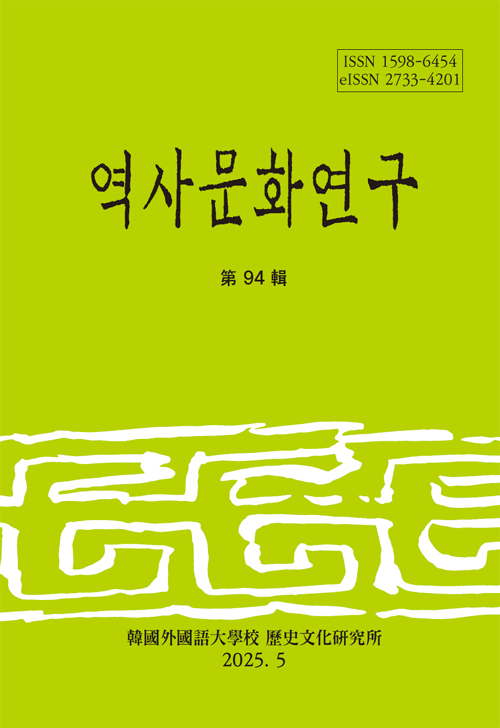- 영문명
- Reflection on Food Culture and the Formation of Food Nationalism in 1970s Japan
- 발행기관
- 한국외국어대학교 역사문화연구소
- 저자명
- 조훈상(HunSang Cho)
- 간행물 정보
- 『역사문화연구』제94집, 165~198쪽, 전체 34쪽
- 주제분류
- 인문학 > 역사학
- 파일형태
- 발행일자
- 2025.05.31

국문 초록
본 연구는 1970년대 일본 사회에서 음식민족주의가 형성되는 과정을 당대 일본이 경험한 복합적 위기와 이에 대한 문화적 대응을 통해 분석하고자 한다. 특히 기존 연구가 주목하지 않았던 고대식운동(古代食運動)과 일상식(日常食) 담론이라는 두 가지 사회문화적 현상을 중점적으로 살펴본다.
1970년대 일본은 두 가지 중대한 위기에 직면했다. 하나는 1970년대 초 세계식량위기가 촉발한 ‘식량안보 위기’다. 이는 식량자급률이 낮은 일본이 음식의 선택 및 소비가 민족의 생존과 결부되어 있다는 인식을 각성하는 계기였다. 다른 하나는 서구식 식생활의 급속한 확산이 초래한 ‘문화 위기’로, 전통적 식습관의 붕괴를 민족공동체의 해체와 동일시하는 현상이었다. 이러한 위기의식은 ‘일본적인 음식문화’에 대한 재평가를 촉진했다.
고대식운동은 이때 등장한 사회현상이었다. 이 운동은 채식 중심의 고대 식생활로 회귀할 것을 주창하며, 현대적 삶에 ‘오염된’ 일본인의 신체와 정신을 ‘정화’하고자 했다. 본 연구는 이 운동을 문화‘침략’에 대항하여 민족적 순수성을 회복하려 한 문화적 실천으로 파악한다. 한편, 일상식 담론은 기존 ‘일본 요리’ 관념을 근본적으로 전복하려는 문화적 현상이었다. 이 담론은 의례식·연회식 등 비일상 요리(晴料理) 중심의 기존 ‘일본 요리’ 개념을 비판하고, 평범한 가정식과 서민 음식 등 일상 요리(褻料理)에 일본요리의 정수가 있다고 주장했다. 일상식 담론은 학술적 문제 제기에 그치지 않고, ‘어머니의 손맛(おふくろの味)’ 유행 같은 사회현상과 결합하여 음식문화가 보존해야 할 문화적 자산이라는 인식을 확산시켰다.
영문 초록
This study analyzes the formation process of food nationalism in 1970s Japanese society through an examination of the complex crises Japan experienced during this period and the cultural responses these challenges engendered. Particular attention is directed toward two sociocultural phenomena that previous scholarship has insufficiently addressed: the Ancient Diet Movement and everyday food discourse.
Japan confronted two significant crises during the 1970s. The first was a “food security crisis” precipitated by the global food crisis of the early 1970s. This crisis compelled Japan, with its low food self-sufficiency ratio, to recognize that food selection and consumption were intrinsically linked to national survival. The second was a “cultural crisis” resulting from the rapid proliferation of Western dietary practices, wherein the dissolution of traditional food habits was equated with the disintegration of the national community. These perceptions of crisis catalyzed a reassessment of “Japanese food culture.”
The Ancient Diet Movement emerged as a social phenomenon within this context. This movement advocated a return to an ancient, plant-centered diet, seeking to “purify” the bodies and minds of Japanese people “contaminated” by modern life. This study interprets the movement as a cultural practice aimed at restoring national purity in response to “cultural invasion.”
The everyday food discourse represented a cultural phenomenon that challenged conventional notions of “Japanese cuisine.” This discourse criticized the existing concept of Japanese cuisine centered on ceremonial and banquet dishes and argued that the essence of Japanese cuisine resided in ordinary home cooking and common people’s food. Beyond academic discourse, this perspective merged with social phenomena such as the “mother’s taste” boom, propagating the understanding that food culture constituted a cultural asset worthy of preservation.
목차
Ⅰ. 머리말
Ⅱ. 식생활에 ‘민족’을 담다: 1970년대의 음식문화 담론
Ⅲ. 사회문화적 맥락: 식량안보 위기와 문화‘침략’
Ⅳ. ‘원시의 건강’을 향한 민족적 열망: 고대식운동의 부상
Ⅴ. 평범함 속 일본의 ‘정수’: 일상식 담론과 ‘어머니의 손맛’
Ⅵ. 맺음말
키워드
해당간행물 수록 논문
참고문헌
최근 이용한 논문
교보eBook 첫 방문을 환영 합니다!

신규가입 혜택 지급이 완료 되었습니다.
바로 사용 가능한 교보e캐시 1,000원 (유효기간 7일)
지금 바로 교보eBook의 다양한 콘텐츠를 이용해 보세요!


